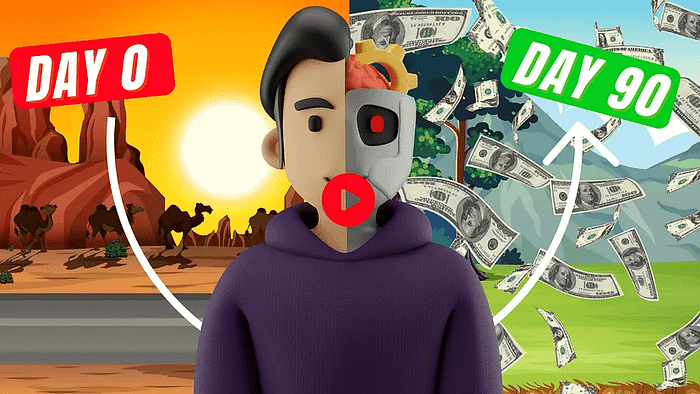This Dead Simple AI Content Marketing Strategy Actually Makes Money
I’ve discovered an AI content marketing strategy that’s revolutionizing the way we create and monetize content online. This approach isn’t just another fleeting trend; it’s a game-changer that’s helped me boost my traffic by over 400% and secure top rankings for numerous competitive keywords. The best part? It’s fully automated, creating content clusters effortlessly while leveraging ChatGPT to write all the articles. In this post, I’ll dive deep into this strategy, sharing AI prompts, frameworks, and insider tips to help you replicate my success.
We strongly recommend that you check out our guide on how to take advantage of AI in today’s passive income economy.
Table of Contents
The Power of Content Clusters
When I first stumbled upon this AI content marketing strategy, I was skeptical. However, the results speak for themselves. I’ve managed to rank number one for a diverse range of keywords, from “funny YouTube video ideas” to “Couples YouTube video ideas” and even “Fortnite YouTube video ideas.” The secret lies in creating content clusters – a main target keyword with additional modifiers like “funny,” “couples,” or specific niches like “Fortnite.”
This AI content marketing strategy isn’t limited to just YouTube-related topics. I’ve successfully applied it to Instagram content and various blogging niches, resulting in a significant traffic surge. To put things into perspective, I started implementing this approach in early January. For about three months, there was minimal movement. But then, something extraordinary happened.
As the number of organic pages increased, so did my traffic. It skyrocketed from virtually nothing to a staggering 180,000 sessions per month. This steady growth is a testament to the effectiveness of this AI content marketing strategy. It’s not just about creating more content; it’s about creating strategically interconnected content that search engines love.
The AI Tool That Makes It All Possible
At the heart of this AI content marketing strategy is a powerful tool called Machine. This AI-powered content creation platform is designed to generate content clusters and write articles automatically. It’s user-friendly and offers both free and paid options, making it accessible to content creators at various levels.
To give you a practical example, let’s say we want to create content about fitness workouts, specifically focusing on back workouts. Using Machine, I simply input “fitness workouts back workouts” as the specific subnation topic for the content cluster. The tool then generates a list of related subtopics, such as “dumbbell back workouts,” “barbell back workouts,” “upper back workouts,” and “bodyweight workouts.”
What sets Machine apart in this AI content marketing strategy is its ability to provide valuable insights alongside these topic suggestions. It displays metrics like search volume and competition level, helping you make informed decisions about which topics to pursue. This data-driven approach ensures that your content efforts are focused on areas with the highest potential for traffic and engagement.
Customizing Your AI-Generated Content
One of the key strengths of this AI content marketing strategy is the level of customization it offers. Once you’ve selected your topics, you can fine-tune various aspects of the content creation process. For instance, you can choose the length of the articles, ranging from short snippets to comprehensive long-form pieces.
The AI model used for content generation is also customizable. In my experience, opting for GPT-4 yields the best results in terms of quality and coherence. However, the true magic lies in the tone settings. After extensive testing with various AI content detection tools, I’ve found that setting the tone to “friendly” consistently produces content that appears more human-written.
Another crucial setting in this AI content marketing strategy is the perspective. I always opt for the first-person perspective, as it adds a personal touch to the content, making it more relatable and engaging for readers. This approach has proven to be particularly effective in building a connection with the audience and establishing authority in the chosen niche.
Humanizing AI-Generated Content
A critical aspect of this AI content marketing strategy is ensuring that the generated content doesn’t come across as robotic or artificial. Machine offers a “humanize” option, which I highly recommend using. Without this feature, the content may flag as 100% AI-generated in various detection tools, potentially harming your site’s credibility and search rankings.
The humanization process adds subtle variations and nuances to the text, making it more natural and less likely to be identified as AI-generated. This step is crucial in maintaining the authenticity of your content and preserving your site’s integrity in the eyes of both readers and search engines.
Interlinking and Visual Elements
An often overlooked aspect of content creation is the importance of internal linking. This AI content marketing strategy takes care of that automatically. When generating a cluster of articles, you can enable the interlinking feature. This ensures that all the articles within the cluster are interconnected, creating a web of related content that enhances user experience and boosts SEO.
Visual elements are another vital component of engaging content. Machine integrates seamlessly with image providers like DALL-E, Unsplash, and Pixabay, allowing you to add relevant, high-quality images to your articles automatically. You can even specify the style of images you prefer, whether it’s abstract art, data visualizations, collages, or sci-fi-inspired graphics.
Creating a New Content Cluster
To illustrate the versatility of this AI content marketing strategy, let’s walk through the process of creating a content cluster from scratch. For this example, we’ll focus on the topic of “patio furniture ideas.” This niche could be relevant for a blog targeting homeowners aged 20-60 who are looking for inspiration to spruce up their outdoor spaces.
Using Machine’s autopilot feature, we can generate a large cluster of 30 related topics. The AI analyzes the main topic and creates a comprehensive list of subtopics, covering various aspects of patio furniture and design. This might include topics like “patio design ideas,” “outdoor privacy solutions,” “poolside furniture arrangements,” and “fire pit seating options.”
The beauty of this AI content marketing strategy is that it doesn’t just stop at topic generation. With a few clicks, you can bulk edit all the generated topics, setting parameters like content length, tone of voice, and perspective. This ensures consistency across your entire content cluster while saving you hours of manual work.
Optimizing for Originality and Search Engines
In my experiments with this AI content marketing strategy, I’ve discovered that the combination of settings you choose can significantly impact the perceived originality of the content. For instance, using the “friendly” tone with the humanizer feature enabled consistently produces content that scores high on originality tests.
To put this into perspective, when I tested content generated with a professional or neutral tone without the humanizer, it scored 100% as AI-generated. Switching to a casual tone improved the score slightly to 69% original. However, using the friendly tone with the humanizer feature enabled bumped the originality score up to an impressive 86%.
This level of originality is crucial for two reasons. First, it helps your content pass AI detection tools, which are becoming increasingly common among search engines and content platforms. Second, and more importantly, it ensures that your readers are getting fresh, engaging content that doesn’t feel generic or mass-produced.
Seamless Integration with WordPress
One of the most time-consuming aspects of content creation is often the process of transferring the written content to your website. This AI content marketing strategy eliminates that bottleneck entirely. Machine offers a seamless integration with WordPress, allowing you to publish content directly to your site with just a few clicks.
The setup process is remarkably simple. You just need to add your WordPress site to Machine’s CMS connections. This is a one-time process that involves clicking a “connect” button and verifying your site. Once set up, you can publish articles directly from Machine to your WordPress site as drafts or even as published posts.
This integration is a game-changer in terms of workflow efficiency. You can bulk publish entire content clusters to your site, saving hours of copy-pasting and formatting. The system even allows you to set categories, add URL slugs, and customize other metadata directly from the Machine interface.
Fine-Tuning and Human Touch
While this AI content marketing strategy automates a significant portion of the content creation process, it’s important to remember that a human touch is still valuable. Once the articles are in your WordPress dashboard, I recommend reviewing them for any factual errors, adding personal insights or experiences, and double-checking the internal links.
This review process doesn’t have to be time-consuming. With the bulk of the work done by AI, you can focus on adding those unique elements that make your content stand out. This might include personal anecdotes, expert opinions, or recent data that the AI might not have access to.
The key is to find the right balance between AI efficiency and human creativity. This AI content marketing strategy provides an excellent foundation, allowing you to scale your content production dramatically while still maintaining quality and authenticity.
Manual Cluster Creation for Niche Topics
While the autopilot feature of Machine is incredibly useful, there are times when you might want more control over your content cluster creation. This is particularly true for niche topics or areas where you have specific expertise. In such cases, this AI content marketing strategy offers a manual cluster creation option.
Let’s take the example of creating a content cluster around “vegan recipes.” Instead of relying solely on Machine’s suggestions, you can use additional AI tools to generate a more comprehensive and tailored list of subtopics. I often use an AI framework with Claude to generate keyword ideas in these situations.
By inputting “vegan recipes” into this tool, you might get suggestions like “easy vegan meals,” “vegan protein sources,” “vegan baking ideas,” “vegan breakfast recipes,” and “vegan meal planning tips.” You can then take these AI-generated suggestions and manually input them into Machine to create a more focused and relevant content cluster.
Scaling Content Production
The real power of this AI content marketing strategy becomes apparent when you start scaling your content production. With Machine, you can select multiple topics within a cluster and generate content for all of them simultaneously. You can set parameters like article length, AI model, tone, and perspective for the entire batch.
This batch processing capability allows you to create vast amounts of content in a fraction of the time it would take to write manually. For instance, you could generate 20 or 30 articles on various aspects of vegan cooking in the time it might traditionally take to write one or two articles.
However, it’s important to approach this scaling thoughtfully. While the AI can generate content quickly, you should still maintain oversight to ensure that the content aligns with your brand voice and meets your quality standards. The goal is to use this AI content marketing strategy to augment your efforts, not to replace human creativity and expertise entirely.
Monetization Strategies
Now that we’ve covered the content creation aspect of this AI content marketing strategy, let’s discuss how it translates into revenue. The increased traffic and improved search rankings that result from this approach open up several monetization opportunities.
Ad Revenue: With a significant increase in traffic, you can leverage display advertising to generate passive income. Platforms like Google AdSense, Media.net, or premium ad networks can be integrated into your site to monetize your increased pageviews.
Affiliate Marketing: The diverse range of topics you can cover with this AI content marketing strategy allows for numerous affiliate marketing opportunities. You can include relevant product recommendations within your content, earning commissions on resulting sales.
Digital Products: As you establish authority in various niches, you can create and sell digital products like e-books, courses, or templates related to your most popular content clusters.
Sponsored Content: Brands are always looking for websites with engaged audiences. Your improved traffic and rankings make your site more attractive for sponsored post opportunities.
Consulting or Services: Depending on your niche, the expertise you demonstrate through your content can lead to consulting opportunities or service-based income.
The key to successful monetization with this AI content marketing strategy is to align your revenue streams with the interests and needs of your audience. The content clusters you create should naturally lead to relevant monetization opportunities without feeling forced or overly promotional.
Staying Ahead of AI Developments
One of the most exciting aspects of this AI content marketing strategy is that it’s constantly evolving. As AI technology advances, the tools and techniques we use become more sophisticated and effective. Staying informed about these developments is crucial to maintaining a competitive edge.
I make it a point to regularly explore new AI tools and features that can enhance this content creation process. This might include experimenting with different AI writing models, testing new content optimization tools, or exploring advanced SEO plugins that work well with AI-generated content.
Additionally, I pay close attention to search engine algorithm updates and how they interact with AI-generated content. This allows me to adjust my strategy proactively, ensuring that my content remains search-engine friendly and continues to perform well in rankings.
Building a Community Around Your Content
While this AI content marketing strategy is incredibly efficient for producing content at scale, it’s important not to lose sight of the human element. Building a community around your content can significantly amplify its impact and create more opportunities for engagement and monetization.
Encourage comments and discussions on your articles. Respond to reader questions and foster a sense of community. This not only increases engagement but also provides valuable insights into what your audience wants, helping you refine your content strategy further.
Consider creating a newsletter or an email list to keep your audience informed about new content. This direct line of communication can be invaluable for building loyalty and driving repeat traffic to your site.
Social media platforms can also play a crucial role in extending the reach of your content. Share your articles, engage with followers, and use these platforms to gather ideas for future content clusters.
Ethical Considerations and Transparency
As we leverage this powerful AI content marketing strategy, it’s crucial to consider the ethical implications and maintain transparency with our audience. While the content is AI-generated, the ideas, strategies, and overall direction should come from human expertise and experience.
I always recommend being open about the use of AI in your content creation process. This transparency can actually be a point of interest for many readers, showcasing how you’re leveraging cutting-edge technology to provide them with comprehensive, well-researched content.
It’s also important to fact-check and verify the information provided by AI. While tools like Machine are incredibly advanced, they can sometimes produce inaccuracies or outdated information. As content creators, it’s our responsibility to ensure the accuracy and reliability of the information we publish.
Conclusion
This AI content marketing strategy has truly transformed my approach to content creation and online business. By leveraging the power of AI to generate comprehensive content clusters, I’ve been able to dramatically increase my website traffic, improve search rankings, and open up new monetization opportunities.
The key to success with this strategy lies in finding the right balance between AI efficiency and human creativity. While AI tools like Machine do the heavy lifting in terms of content generation, it’s the human touch – our expertise, experiences, and strategic thinking – that truly makes the content valuable and engaging for our audience.
As we move forward in this AI-driven era of content creation, I’m excited about the possibilities that lie ahead. This strategy is just the beginning, and I believe we’ll see even more innovative ways to create, optimize, and monetize content in the near future.
Remember, the goal of this AI content marketing strategy isn’t just to produce more content faster. It’s about creating valuable, relevant, and engaging content that serves your audience while also achieving your business objectives. When done right, it’s a win-win situation for both content creators and consumers.
I encourage you to explore this strategy for yourself, adapt it to your niche, and see how it can transform your own content marketing efforts. The future of content creation is here, and it’s more accessible and powerful than ever before.
Frequently Asked Questions:
How can AI help content marketing?
AI can significantly enhance content marketing efforts in several ways:
- Content Generation: AI tools can create drafts, outlines, and even full articles on various topics.
- Topic Ideation: AI algorithms can analyze trends and suggest relevant content ideas.
- SEO Optimization: AI can help optimize content for search engines by suggesting keywords and improving readability.
- Personalization: AI can tailor content to individual user preferences and behaviors.
- Content Analysis: AI tools can analyze existing content performance and suggest improvements.
- Automated Content Curation: AI can help curate relevant content from various sources.
- Chatbots for Customer Engagement: AI-powered chatbots can provide instant responses to customer queries.
- Predictive Analytics: AI can forecast content performance and audience engagement.
How can artificial intelligence be implemented in marketing strategies?
Artificial intelligence can be integrated into marketing strategies in various ways:
- Customer Segmentation: AI can analyze data to create more accurate customer segments.
- Predictive Customer Behavior: AI algorithms can forecast customer actions and preferences.
- Programmatic Advertising: AI can optimize ad placements and bidding in real-time.
- Email Marketing Optimization: AI can determine the best times to send emails and personalize content.
- Social Media Management: AI tools can schedule posts and analyze engagement.
- Voice Search Optimization: AI can help optimize content for voice search queries.
- Dynamic Pricing: AI can adjust pricing based on demand and competitor analysis.
- Sentiment Analysis: AI can analyze customer feedback and social media mentions.
How does AI marketing make money?
AI marketing can contribute to revenue generation in several ways:
- Increased Conversion Rates: AI-optimized content and personalized experiences can lead to higher conversions.
- Cost Reduction: Automating tasks with AI can reduce labor costs and increase efficiency.
- Improved Customer Retention: AI-driven personalization can enhance customer loyalty and lifetime value.
- Enhanced Ad Performance: AI can optimize ad targeting and placement, improving ROI.
- New Product Development: AI insights can guide the creation of products that meet market demands.
- Upselling and Cross-selling: AI can identify opportunities for additional sales based on customer behavior.
- Pricing Optimization: AI can determine optimal pricing strategies to maximize revenue.
- Lead Scoring: AI can identify and prioritize high-value leads, improving sales efficiency.
How effective is AI in marketing?
AI has proven to be highly effective in marketing, with numerous benefits:
- Improved Efficiency: AI can automate repetitive tasks, freeing up time for strategic activities.
- Enhanced Personalization: AI enables hyper-personalized marketing at scale.
- Data-Driven Decisions: AI can process vast amounts of data to inform marketing strategies.
- Real-Time Optimization: AI can make instant adjustments to campaigns based on performance data.
- Improved ROI: By optimizing various aspects of marketing, AI can lead to better returns on investment.
- Scalability: AI allows marketers to manage and analyze large-scale campaigns effectively.
- Predictive Capabilities: AI can forecast trends and customer behaviors, enabling proactive marketing.
- 24/7 Customer Service: AI-powered chatbots can provide round-the-clock customer support.
While AI is highly effective, it’s important to note that human oversight and creativity are still crucial for developing overarching strategies and maintaining brand voice.

We strongly recommend that you check out our guide on how to take advantage of AI in today’s passive income economy.




